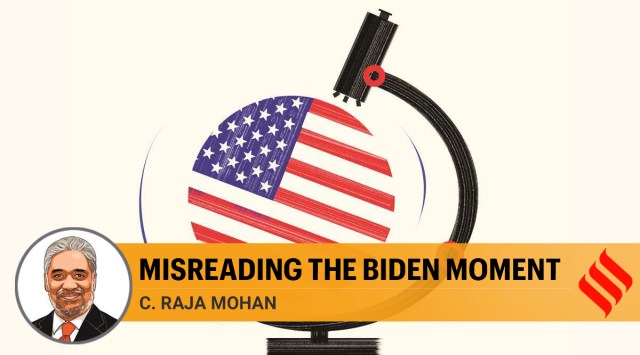- India
- International
A narrow focus on bilateral ties produces a shallow Indian debate on America
What stands out from our debates on Biden policies is India’s regrettable under-investment in the study of US society, its political economy and international relations.
 What stands out from our debates on Biden policies is India’s regrettable under-investment in the study of US society, its political economy and international relations. (Illustration by C R Sasikumar)
What stands out from our debates on Biden policies is India’s regrettable under-investment in the study of US society, its political economy and international relations. (Illustration by C R Sasikumar)
The extraordinary and popular Indian interest in the US elections can be attributed, at least in part, to the growing engagement between the two countries over the last couple of decades. But so long as the widening interface between the two societies is not matched by a greater awareness of America’s complex internal dynamics, multiple misperceptions will continue to define India’s public discourse on the US.
One is the illusion that Indians have a say in the US elections. That might be explained by the prolonged spectacle that the US presidential election has become and the endless speculation on what’s in it for India. Notwithstanding the growing number of Indian-American voters and the historic significance of Kamala Harris, it is important to remember that the elections are about American and not Indian politics.
Since the US occupies so much of our mind space, it is easy to believe that America might be spending a lot of time thinking about India. America indeed matters to India, and everyone else in the world, more than any one of us matters to the US. That is because the US is the dominant power in the international system and even minor shifts in its policies have big implications for others. But the reverse is not true.
That brings us to that perennial debate about who is good for India — Donald Trump or Joe Biden? Republicans or Democrats? These are interesting but inconsequential questions, since India’s preference can’t make a difference to the electoral outcome in the US. What is relevant is the reality that India, like all other countries, has no option but to deal with whoever is elected to the White House.

The US presidential election this year has unfortunately got enmeshed with India’s internal political contestations. Trump’s defeat is being interpreted by some as a setback for Indian Prime Minister Narendra Modi because Delhi has invested so much in the relationship with the Trump administration. To make it even more interesting, there is much speculation that Biden might be nursing a grievance against Modi because the Indian PM was buttering up Trump at the “Howdy Modi” rally in Houston last fall. Biden has far too much on his plate to waste time plotting on how to get even with Modi for saying “Abki bar, Trump Sarkar”.
This debate tells us more about the divisions within India and how they colour our judgements of other societies. Some in Delhi hope and others fear that the US Congress has the wisdom or the power to set right India’s internal problems. Those who are hopeful or anxious about critical comments from a section of the Democratic Party’s legislators about Kashmir and the Citizenship Amendment Act tend to overdetermine the weight of these concerns in the conduct of the US foreign policy towards India.
Like Biden, the US Congress has multiple domestic issues, including systemic racism, to handle, before putting the Modi government in the dock. While some in Congress — the House of Representatives has 435 members and the Senate 100 — focus on human rights and religious freedom, others want to open India’s market and deepen greater bilateral defence cooperation. The US Congress is a vibrant legislature where all kinds of interests and ideas find vigorous articulation.
Explained: What does President-elect Joe Biden mean for India, its relationship with the US?
Congress is an important part of the US government, but only some of the ideas debated there translate into Washington’s policies. The last two decades have seen strong support from the US Congress to the executive on strengthening all-round cooperation with India. There is no reason to see that changing under the next President and Congress, if Delhi stays engaged with both.
While enduring national interests drive American foreign policy towards India, personal and subjective factors are quite important in the routine conduct of international relations. If personnel is policy, Delhi starts out on a good footing with President Biden.
Those who remember the twists and turns of the historic civil nuclear initiative during 2005-08, will fondly recall the role of Senator Biden in mobilising the much-needed congressional support for India in Washington at critical junctures that demanded urgent legislative action. Equally important are the personnel manning the ramparts of the US foreign and security policy under Biden. Many individuals expected to take up top positions under Biden have worked with him when he was Vice President in the Obama Administration. The Indian establishment is familiar with most of them.
Two professionals being mentioned for Biden’s Secretary of State —Antony Blinken and William Burns — have worked closely with the Indian government on a range of issues during the Obama years. Susan Rice, another candidate, was Obama’s national security adviser in the second term and was envoy to the UN in the first. Michele Flournoy, who could well become the first woman to head the Pentagon, served as the Under Secretary of Defence in the Obama years and was very much involved in strengthening security cooperation with India.
Most of the other sub-cabinet officials too would come from the Obama stable or the Congressional staff. Thanks to India’s wider and deeper engagement with the US in the last two decades, India will find a lot of familiar faces across the administration.
While the Indian public discourse focuses on such exciting issues like Biden’s thoughts on the “Howdy Modi” rally, the government is hopefully preparing to deal with the consequential issues at the top of the new Administration’s agenda — trade and economic security for the US, climate change, health security, and rebuilding alliances. China figures prominently in all of them.
What stands out from our debates on Biden policies is India’s regrettable under-investment in the study of US society, its political economy and international relations. The public focus is naturally on bilateral relations and on the developments of the day. As the American salience continues to rise for India, Delhi badly needs the capacity to analyse the structural forces shaping US policies.
Opinion | Saikat Majumdar writes: Current suspicion of higher education in US may outstay Trump
A narrow focus on bilateral ties produces a shallow Indian debate on America. A better understanding of the deeper forces animating America helps us deal more productively with the United States.
Russia and China have invested quite heavily in academic and policy research on the US. If the Russians inherited a large structure from the Soviet Union, China has systematically built-up American Studies as a discipline in its universities and think tanks in the last three decades.
India went the other way. Just as relations with the US began to take off, India shut down a premier institute — the American Studies Research Centre at Osmania University, Hyderabad. When the US funding for the ASRC stopped in the late 1990s, India could not find the resources to sustain it. Maybe Delhi can revive that institution or start building a new one devoted to the study of the United States. For America today is India’s most important international partner, and the connections between our two societies are getting thicker by the day.
This article first appeared in the print edition on November 10, 2020 under the title ‘Misreading the Biden moment’. The writer is director, Institute of South Asian Studies, National University of Singapore and a contributing editor on international affairs for The Indian Express
EXPRESS OPINION
Must Read
More Explained
Apr 19: Latest News
- 01
- 02
- 03
- 04
- 05









































